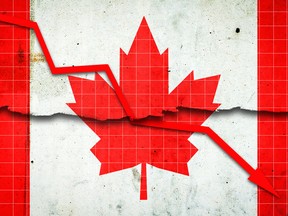As global economic tensions escalate, Canada finds itself at the center of a brewing storm with the potential imposition of tariffs by the United States. Economic experts warn that these tariffs could thrust Canada into a recession by mid-year, significantly impacting the nation's economic stability and growth prospects.
The Potential Impact of U.S. Tariffs
The U.S. government's consideration of tariffs on key Canadian exports, including steel, aluminum, and agricultural products, poses a significant threat to Canada's economy. These industries are vital to the Canadian economy, providing thousands of jobs and contributing substantially to the nation's GDP.
Tariffs on these exports would lead to increased costs for Canadian goods, making them less competitive in the U.S. market. This decrease in competitiveness could result in reduced demand, lower production levels, and ultimately, job losses. The ripple effects would be felt across various sectors, from manufacturing to agriculture, compounding the economic challenges.
Economic Forecast: A Looming Recession
Economic analysts predict that the imposition of tariffs could lead to a contraction in Canada's economy, potentially plunging the country into a recession by mid-year. A recession is typically characterized by a significant decline in economic activity, reduced consumer spending, and increased unemployment rates.
The Bank of Canada has already expressed concerns about the potential impact of tariffs on the national economy. In a recent statement, the Bank highlighted the risks posed by trade disruptions and emphasized the need for proactive measures to mitigate the potential fallout.
The Role of Consumer Confidence
Consumer confidence plays a crucial role in economic stability. The threat of tariffs and the potential for a recession could lead to a decline in consumer confidence, resulting in reduced spending and investment. This decline would further exacerbate the economic slowdown, creating a vicious cycle of reduced demand and economic contraction.
Businesses, facing uncertainty about future trade relations and market conditions, may also reduce their investments and hiring plans. This cautious approach could lead to slower economic growth and increased unemployment, further straining the economy.
Government Response and Mitigation Strategies
In response to the looming threat of tariffs, the Canadian government is exploring various strategies to mitigate the potential economic impact. These strategies include:
Diversifying Trade Partners: Canada is seeking to expand its trade relationships with other countries to reduce reliance on the U.S. market. By diversifying its export destinations, Canada can mitigate the impact of U.S. tariffs and strengthen its economic resilience.
Supporting Affected Industries: The government is considering providing financial support and incentives to industries most affected by the tariffs. This support could help stabilize these industries and preserve jobs.
Negotiating Trade Agreements: Engaging in diplomatic efforts to negotiate favorable trade agreements with the U.S. and other countries is a priority. These agreements could help secure market access and reduce trade barriers.
Investing in Innovation and Competitiveness: To enhance the competitiveness of Canadian industries, the government is promoting investments in innovation, research, and development. These investments can help industries adapt to changing market conditions and maintain their competitive edge.
The Importance of a United Front
A coordinated response involving the federal government, provincial governments, and industry stakeholders is crucial to effectively address the challenges posed by potential tariffs. Unity and collaboration can strengthen Canada's position in trade negotiations and ensure that the nation's economic interests are safeguarded.
Proactive measures, coupled with a focus on long-term economic resilience, will be essential to navigate the uncertainties posed by global trade tensions. By prioritizing economic diversification, supporting affected industries, and fostering innovation, Canada can mitigate the impact of tariffs and chart a path toward sustained economic growth.
Conclusion
The potential imposition of U.S. tariffs on Canadian exports presents a significant risk to Canada's economic stability. With the threat of a recession looming by mid-year, it is imperative for the Canadian government and industry stakeholders to take proactive steps to mitigate the impact. Through diversification, support for affected industries, and strategic trade negotiations, Canada can navigate these challenges and emerge stronger, ensuring long-term economic resilience and prosperity.







0 Comments